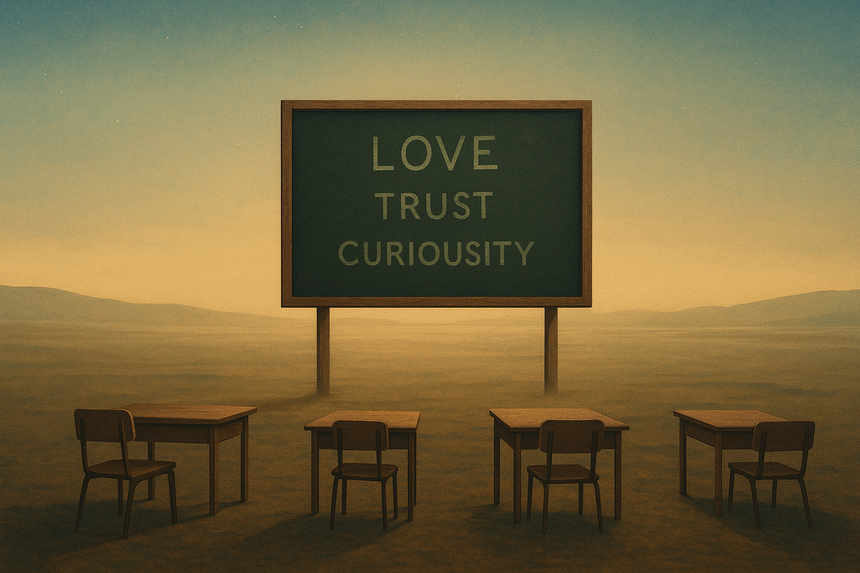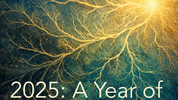Purpose: To strip away societal conditioning and reimagine how humanity might rebuild education, values, and systems if we began again.
Imagine the First Morning
Imagine waking up tomorrow and the rulebook for how to raise, teach, and govern had vanished.
No schools. No prisons. No politics as we know them.
Just people; parents, children, communities; standing together, wondering what to do next.
If we started again, what would we teach first?
And why?
The Myth of the Blank Slate
Every parent knows that children are not empty vessels waiting to be filled.
They arrive already curious, expressive, and full of a quiet knowing — a spark that says, I am me.
Even identical twins, with matching DNA, express unique rhythms of thought and emotion.
So, why do our systems, educational, social, and even judicial, still treat humans as if they were programmable?
We have built institutions that focus more on:
- Compliance rather than consciousness,
- Performance rather than purpose,
- Grades instead of growth.
The Curriculum of Fear
Think of a time you were judged harshly for making a mistake, a test you failed, a rule you broke, a moment of human imperfection.
- How did it feel?
- What did it teach you about yourself?
For many, the lesson was not curiosity or courage to try again, but fear.
- Fear of failing.
- Fear of being wrong.
- Fear of being less than.
From this invisible curriculum, we learn that love and worth must be earned.
But what if that is the lesson that keeps us small?
From Parental Love to Systemic Conditionality
Parents (hopefully) love unconditionally. They comfort us when we cry and celebrate when we explore. But as we grow, the world teaches a different story:
If you achieve, you’ll be rewarded. If you fail, you’ll be punished.
- Education becomes a transaction.
- Work becomes an obligation.
- Justice becomes retribution.
And so, generation after generation, we pass down not just knowledge, but anxiety, control, and inherited fear.
The Invisible Curriculum: What Society Really Teaches
Every society teaches its children what it values most. Sometimes that’s compassion and creativity. Other times, obedience and output.
Every time we follow a rule, pass a test, or earn a reward, we are learning what our culture values, not just what it knows. But what if the values we’re learning are not the ones we truly wish to live by?
Richard Barrett’s 7 Levels of Consciousness reminds us that evolution begins when we become aware of what truly drives us.
- At Level 1 (Survival), societies value safety, order, and control.
At Level 2 (Relationship), we begin to value trust, belonging, and empathy.
Fear keeps us clinging to the first. Love invites us toward the second.
Progress isn’t about rejecting Survival, it’s about building upon it, like courses of bricks forming a wall that can finally reach the light.
A Classroom Reimagined
- What if schools were built around values rather than tests?
- What if the justice system became a place for learning, not punishment?
- What if leadership were measured not by control, but by compassion and coherence?
Perhaps re-educating humanity isn’t about starting over — it’s about rediscovering what we once knew:
- True education is not transactional but relational.
- It requires vulnerability, presence, and the acceptance of imperfections.
Like a child learning through care, not correction, this is the essence of relational education.
It is the foundation of coaching, therapy, and the kind of growth that happens when we are seen, not judged.
This is the kind of learning that invites courage, curiosity, and connection — not fear, performance, or control.
A Reflective Exercise
- Write down one value you feel is missing in your environment — at work, at home, or in society.
- Now imagine a classroom where that value was the first lesson of every day. What would change?
Reflective Invitation
- If you woke up tomorrow with no memory of how you were taught, how would you choose to learn?
- What values would you want woven into the first lessons of a new civilisation?
- Where in your life do fear-based systems still shape your sense of worth or belonging?
Next: Post 2 – The Myth of the Empty Vessel
We’ll explore how one deeply embedded belief, that we are born blank, continues to shape education, justice, and human potential.
 unknownx500
unknownx500


